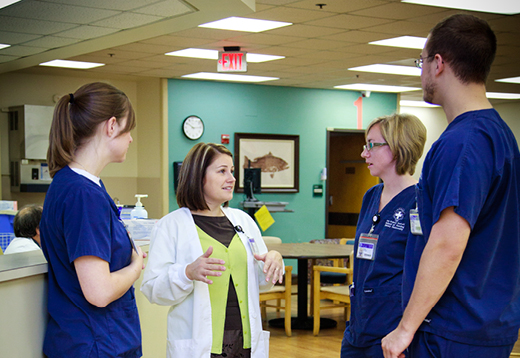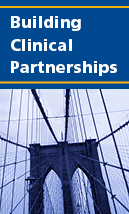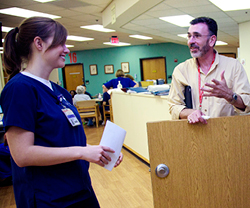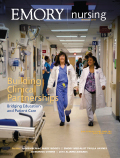Minding the Generation Gap

Carolyn Clevenger 02N 04MN creates opportunities for students to interact with healthy seniors.
|
|
SENIOR LIVING AT WESLEY WOODS:
Nurses are key to healthy aging
The gap between young and old is closing fast for Emory nursing students as geriatric nursing specialist Carolyn Clevenger 02N 04MN creates new opportunities for students to interact with patients.
“Students who want to be nurse practitioners want to be in the community,” says Clevenger, one of a handful of nurse practitioners (NPs) nationwide with doctorates in clinical nursing. “It’s torture for someone who wants to be a primary care provider to spend hours and hours in the hospital and never see community settings. The two roles are very different.”
Clevenger is an energetic powerhouse who thinks, talks, and works fast. In a short time last spring, for instance, she forged a new path for students studying to become NPs. By summer 2010, the 36 students in the first class of the accelerated BSN/MSN program began clinical rotations in three Atlanta residential towers owned by Wesley Woods Senior Living. Emory’s Office of University-Community Partnerships provided a grant to fund the students’ clinical experience.
The need for primary care clinicians skilled in geriatrics grows daily. According to the Administration on Aging, more than 40 million Americans currently are 65 or older. Ten years from now, that number will be more than 54 million. Traditionally, nursing students encounter older patients only in hospitals and nursing homes, where they see only the sickest and most disabled.
“Geriatrics encompasses so much more,” Clevenger says. “The reality is that 95% of the population over 65 live independently in their own homes.”
The Wesley Woods Senior Living rotation has been powerful for students. Simply engaging with elderly people living independently provides important lessons.
“It’s hard to get someone interested in geriatrics if they haven’t been around elderly people,” says Clevenger.
The 36 ABSN/MSN students spent at least six hours a week for four weeks at the independent living towers. They conducted lengthy health interviews with more than 50 residents that included a detailed medical history and nutrition and basic needs assessments.
|
"Trends in health care show that older people will continue to have more contact with nurses than physicans. Nurses are crucial for healthy aging." —Kenneth Weber, Wesley Woods Senior Living |
||||
This single pilot effort resulted in useful outcomes that continue to improve residents’ healthy lifestyles. Students coordinated a community health fair at the towers to target needs identified during the interviews.
“One objective was to improve students’ communication skills by simply talking to elderly people who were well,” says Clevenger.
Students used the interview information to create a thorough (15 pages) personal health record for each resident. In return, residents received goody bags filled with pill holders and other health-related items. Students also analyzed the health information to apprise Wesley Woods staff on residents’ overall health status. These assessments provided information such as the percentage of residents in each building who take medication for high blood pressure (as many as 80% in one building).
“This type of information helps facilities tailor their health education programs around the most important needs of the residents,” says Clevenger.
In fall 2009, another group of her students worked with an independent living facility operated by the Jewish Federation of Greater Atlanta. Data gathered there led to a nutritional intervention offering residents access to an additional nutritionally balanced meal each day. The facility used the data to secure a grant to provide the meals for residents.
“The students asked the staff what information would be most helpful for them,” Clevenger says. “The staff wanted a needs assessment, which showed that a large percentage of the residents have a challenging time cooking healthy, nutritious meals for themselves.”
Most independent-living facilities would be unable to find funding to have a congregate hot meal delivered daily. “Data serves as the basis for grants,” says Clevenger. “Having this hard information brought them a tangible result that will keep their residents healthier.”
That’s the beauty of collaborating with academia, says Kenneth Weber, president of Wesley Woods Senior Living, which owns facilities in Atlanta and north Georgia.
“Furthering knowledge in geriatrics among clinicians is important to our mission,” he says. “The only way we can conduct research is to partner with an institution like Emory.”
“Our residents occasionally see doctors, but the nurses are crucial to our quality of care,” Weber adds. “Nurses spend more time with each patient, and trends in health care show that older people will continue to have more contact with nurses than physicians. Nurses are crucial for healthy aging.”—Valerie Gregg
Valerie Gregg is an Atlanta freelance writer.
|
||||



 Memory Is a Powerful Thing
Memory Is a Powerful Thing